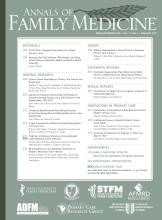Abstract
PURPOSE Opioid misuse in the context of chronic opioid therapy (COT) is a growing concern. Depression may be a risk factor for opioid misuse, but it has been difficult to tease out the contribution of co-occurring substance abuse. This study aims to examine whether there is an association between depression and opioid misuse in patients receiving COT who have no history of substance abuse.
METHODS A telephone survey was conducted at Group Health Cooperative and Kaiser Permanente of Northern California. We interviewed 1,334 patients on COT for noncancer pain who had no history of substance abuse. Patients were asked about 3 forms of opioid misuse: (1) self-medicating for symptoms other than pain, (2) self-increasing doses, and (3) giving to or getting opioids from others. Depression was evaluated by the 8-item Patient Health Questionnaire (PHQ-8).
RESULTS Compared with patients who were not depressed (PHQ-8 score 0 to 4), patients with moderate depression (PHQ-8 score 10 to 14) and severe depression (PHQ-8 score 15 or higher) were 1.8 and 2.4 times more likely, respectively, to misuse their opioid medications for non–pain symptoms. Patients with mild (PHQ-8 score 5 to 9), moderate, and severe depression were 1.9, 2.9, and 3.1 times more likely, respectively, to misuse their opioid medications by self-increasing their dose. There was no statistically significant association between depression and giving opioids to or getting them from others.
CONCLUSION In patients with no substance abuse history, depressive symptoms are associated with increased rates of some forms of self-reported opioid misuse. Clinicians should be alert to the risk of patients with depressive symptoms using opioids to relieve these symptoms and thereby using more opioids than prescribed.
- Received for publication March 29, 2011.
- Revision received September 15, 2011.
- Accepted for publication October 11, 2011.
- © 2012 Annals of Family Medicine, Inc.







